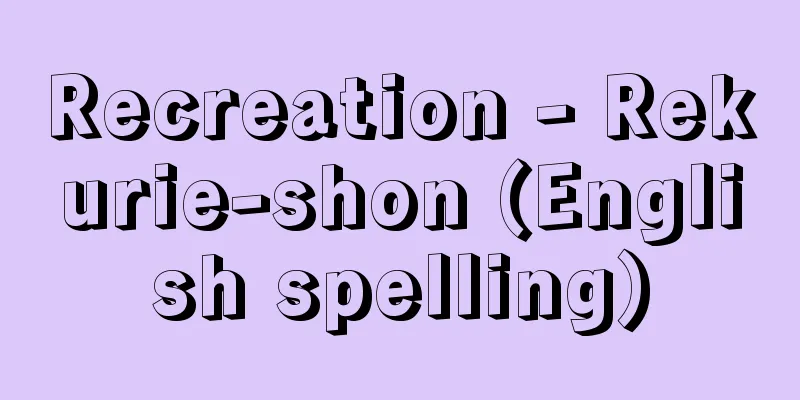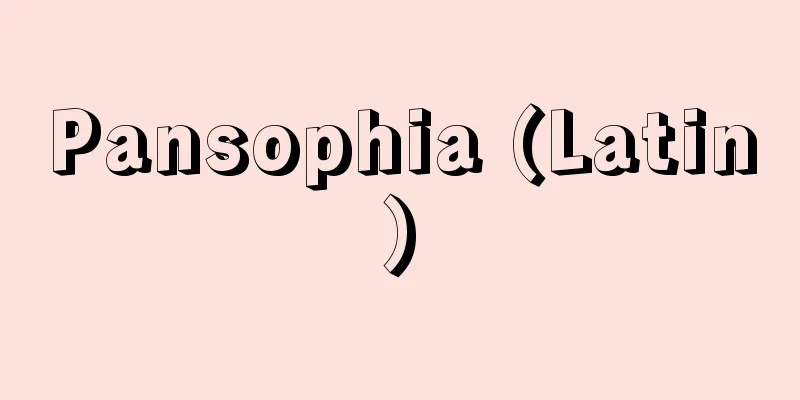Recreation - Rekurie-shon (English spelling)

|
It refers to all activities undertaken during leisure time to restore the body and mind that have become tense and tired due to the constraints or coercion of work, etc., and to generate new energy. Recreation is therefore closely linked to leisure and entertainment, but while leisure refers in a broad sense to a state of unconstrained mind and body, and entertainment refers to the means of enjoyment or the act of enjoyment itself, recreation is a concept that emphasizes the purpose or meaning of refreshing the body and mind. It was after World War II that the word recreation became commonplace and awareness deepened in Japan. The Japan Welfare Association, founded in 1938 (Showa 13), changed its name to the Japan Recreation Association, an incorporated foundation, in 1948 (Showa 23), with the aim of developing recreational activities. [Tamura Yoshio] Content and classificationIt is natural that specific forms of recreation overlap with so-called popular entertainment, such as appreciation of art, creation, musical performance, various pastimes, socializing, games, gambling, sports, festivals and other events, and travel, and these entertainment activities are positioned as recreation when they are undertaken with the clear intention of refreshing the mind and body. When recreation is viewed from more diverse angles, various questions arise, such as whether the activity was undertaken individually or in a group, what the nature of the group was, whether participation was voluntary, and what benefits it provided. In modern society, there are many different means of entertainment, whether they are used for recreation or not. They are diverse, including services and facilities provided by the leisure industry, services and facilities provided by public entities such as government agencies and local governments, certain services provided by local volunteers, and services and facilities provided by companies for the workers they employ. In this context, the future direction of recreation in modern Japan can be gauged to some extent by looking at the trends of workers who are subject to strong constraints and coercion on a daily basis. In the past, when work, play, and family life were all centered around the community, recreation was also centered around the community. However, as modern industrial society developed, the lives of workers came to depend entirely on companies. In particular, Japanese companies adopted a lifetime employment system and had a strong corporate family character, so measures for employee recreation were an important issue from the perspective of corporate management, and companies often provided recreational opportunities for employees and their families on their own. Even when employees participated in personal recreational activities, the people they accompanied often ended up being colleagues, seniors, and juniors from the company, and here too the presence of the company cast a large shadow. [Tamura Yoshio] Recent developmentsHowever, with the times, the consciousness of workers has changed, and employees' sense of closeness to their companies has gradually weakened, and in private life activities there has been a growing tendency to exclude company colleagues and focus on private groups such as family, local people, school friends and hobbies. As for recreational means, people are increasingly using the services of the leisure industry for the general public, while at the same time, the number of people participating in various local activities is increasing. This trend is basically a shift in emphasis from recreation as an employee of an individual company to recreation as a private citizen, and it is expected that this trend will become even stronger as the consciousness of Japanese people changes. [Tamura Yoshio] "The Recreation Encyclopedia, edited by the Japan Recreation Association, three volumes (1975-77, Fumaido Publishing)" ▽ "An Introduction to Recreation, edited by Takahashi Kazutoshi (1980, Fumaido Publishing)" ▽ "The Theory of Recreation Guidance, edited and published by the Japan Recreation Association (1982)" ▽ "Postwar History of Leisure, edited by Ishikawa Hiroyoshi (1979, Tokyo Shoseki)" [Reference] | | |Source: Shogakukan Encyclopedia Nipponica About Encyclopedia Nipponica Information | Legend |
|
仕事などの拘束あるいは強制によって緊張し疲れた肉体と精神を回復させ、新たなエネルギーを生み出すために、余暇(レジャー)を利用して行われる活動全体をいう。したがってレクリエーションは、余暇や娯楽と密接につながる性格をもっているが、余暇が広い意味で心身の非拘束状況をさし、娯楽が楽しむための手段ないし楽しむ行為そのものをいうのに対して、レクリエーションは、肉体と精神のリフレッシュという目的ないし意味づけを重視する考え方である。わが国でレクリエーションということばが一般化し、認識が深まったのは、第二次世界大戦後のことである。1938年(昭和13)設立の日本厚生協会が48年(昭和23)財団法人日本レクリエーション協会と名称を変更し、レクリエーション活動の発展を目ざした。 [田村穣生] 内容と分類具体的なレクリエーションの形態が、鑑賞、創作、演奏・演技、各種の手すさび、社交・交際、ゲーム、ギャンブル、スポーツ、祭りなどのイベント、旅行といったいわゆる大衆娯楽と重なるのは当然のことであり、これらの娯楽活動を、心身のリフレッシュという明確な意図の下に行ったときに、これがレクリエーションとして位置づけられることになる。レクリエーションをさらに多角的にとらえる場合には、活動が個人で行われたか集団で行われたか、その集団はどのような性格の集団であったか、自発的な参加であったか、いかなる効用があったかなど、いろいろな問題が派生してくる。 現代社会には、レクリエーションとして利用されるか否かとは関係なく、さまざまな娯楽手段がある。レジャー産業が提供するサービスや施設、官公庁・自治体など公的な主体が提供するサービスや施設、地域の有志やボランティアによるある種のサービス、そして企業が自ら雇用する勤労者のために提供するサービスや施設など、多種多彩である。このようななかで、現代日本のレクリエーションが今後どのような方向へ進んでいくかということは、日常的に拘束と強制を強く受ける勤労者の動向をみることによって、ある程度読み取ることができる。 かつて、仕事も遊びも家庭生活も、すべてがコミュニティ中心に行われていた時代には、レクリエーションもまたコミュニティ中心であった。しかし、近代産業社会が発達してくると、勤労者の生活は全面的に企業に依存するようになる。とくにわが国の企業は終身雇用制をとり、企業一家主義的色彩が濃厚であったために、企業経営の見地からも従業員のレクリエーション対策は重要な課題であり、企業自らの手で従業員やその家族に対してレクリエーションの機会を提供することが多かった。また、従業員が個人的にレクリエーションを行う場合にも、いっしょに行動する人々は結局、会社の同僚、先輩・後輩などになることが多く、ここにも企業という存在が大きく影を落としていた。 [田村穣生] 最近の動向しかし、時代とともに勤労者の意識も変化して、従業員の企業密着の意識は徐々に弱まりつつあり、私的生活の諸活動には、会社の同僚などを排して、家族や地域の人々、あるいは学校時代の友人や同好の士といった私的グループを中心とする傾向が強まってきた。そしてレクリエーションの手段も、一般向けレジャー産業のサービスを利用することが多くなり、また一方で、地域におけるいろいろな活動に参加する人も増えてきている。このような動向は、基本的には、個別企業の従業員としてのレクリエーションから私的な市民としてのレクリエーションへのウェイトの移動であり、日本人の意識変化に伴って、この傾向がますます強くなるものと考えられる。 [田村穣生] 『日本レクリエーション協会編『レクリエーション大系』全三巻(1975~77・不昧堂出版)』▽『高橋和敏編著『レクリエーション概論』(1980・不昧堂出版)』▽『日本レクリエーション協会編・刊『レクリエーション指導の理論』(1982)』▽『石川弘義編著『余暇の戦後史』(1979・東京書籍)』 [参照項目] | | |出典 小学館 日本大百科全書(ニッポニカ)日本大百科全書(ニッポニカ)について 情報 | 凡例 |
<<: Regulus - Regulus (English spelling)
>>: Reclams Universal-Bibliothek
Recommend
Kigensetsu - National Foundation Day
This holiday was established by the Meiji governm...
Correctional education - Kyoseikyoiku
Legally, it means the education given to juvenile...
Yaso German - Yaso German
By Sugita Genpaku. 3 volumes. Unpublished manuscri...
Scientific and technical provisions
This is a collection of legislative materials, &q...
Laws concerning massage therapists, acupuncturists, moxibustion therapists, etc.
...In 1912, the Ministry of Home Affairs issued t...
scampo
…It is edible. The European lobster Nephrops norv...
Hare-wallaby - Rabbit-wallaby
…Among the mammals belonging to the marsupial fam...
Hippōnax (English spelling) Hipponax
…Years of birth and death unknown. His “mimos” ar...
Andy Warhol
A representative American pop art painter, sculpt...
neurohypophysis
…the adenohypophysis is a gland that is made up o...
Sogdiana - Sogdiana (English spelling)
This is the ancient name for the area centered on...
spectacled caiman (English spelling) spectacled caiman
…Five species are found in the tropical regions o...
Grassroots - Soumou
The term has evolved from the meaning of a patch ...
Kumoi Choshi - Kumoi Choshi
The name of the tuning of the common koto. Tuned t...
Well God - Idogami
〘Noun〙 Water deity worshipped at wells. Deity that...









